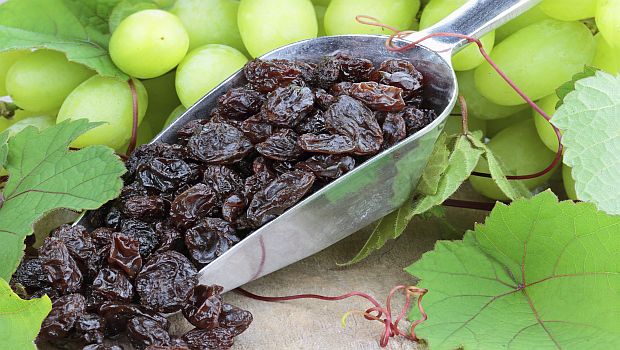The high court found that a U.S. Department of Agriculture order requiring raisin farmers to set aside a percentage of their crops for the government’s benefit free of charge constituted an unconstitutional taking of personal property under the Fifth Amendment to the U.S. Constitution.

The U.S. Supreme Court held last month that the government cannot require raisin farmers to relinquish a portion of their crops without paying them just compensation.
In a majority opinion written by Chief Justice John Roberts, the high court found that a U.S. Department of Agriculture order requiring raisin farmers to set aside a percentage of their crops for the government’s benefit free of charge constituted an unlawful taking of personal property under the Fifth Amendment to the U.S. Constitution.
USDA’s marketing orders—mandating reserves of particular crops including raisins—are authorized by a 1937 law that is intended to promote stable markets for certain agricultural products. A raisin committee disposes of the reserved crops through various means, including sales to exporters and donations to charitable causes, and the farmers who relinquished the crops retain an interest in the sale proceeds. But in the two years at issue in the raisin litigation, the proceeds fell short of the cost of producing the crops, and there were no proceeds the following year.
In 2002-2003, the raisin committee ordered raisin growers to set aside 47 percent of their crops for the government. Raisin growers and handlers Marvin and Laura Horne refused to comply with the reserve order. The government imposed a fine of around $484,000—comprising the market value of the crops—plus a civil penalty totaling just over $200,000.
The U.S. Court of Appeals for the Ninth Circuit rejected the farmers’ argument that the government had violated the Fifth Amendment, which in relevant part forbids the taking of private property “for public use without just compensation."
In overturning the Ninth Circuit, the Supreme Court held that the government’s duty to pay just compensation applies not only to real property but to personal property as well. And the government cannot avoid its duty to pay just compensation by giving the farmer a contingent interest in a portion of the property’s value, the majority pointed out.
“The fact that the growers retain a contingent interest of indeterminate value does not mean there has been no physical taking," Roberts wrote, “particularly since the value of the interest depends on the discretion of the taker, and may be worthless, as it was two years at issue here."
The government argued its reserve requirement didn’t constitute a taking of property because raisin farmers choose to be involved in the market. But Roberts cited a previous case involving a landlord’s rights in which the Supreme Court rejected a similar argument.
In an opinion concurring in part and dissenting in part, Justice Stephen Breyer agreed with the government that the case should be remanded to the lower courts for a determination on whether any just compensation would be due to the farmers had they complied with the marketing order. Justices Ruth Bader Ginsberg and Elena Kagan joined in the opinion.
“On the record before us, the Hornes have not established that the Government, through the raisin reserve program, takes raisins without just compensation," Breyer wrote. “When the Government takes as reserve raisins a percentage of the annual crop, the raisin owners retain the remaining, free-tonnage, raisins. The reserve requirement is intended, at least in part, to enhance the price that free-tonnage raisins will fetch on the open market. And any such enhancement matters. This Court’s precedents indicate that, when calculating the just compensation that the Fifth Amendment requires, a court should deduct from the value of the taken (reserve) raisins any enhancement caused by the taking to the value of the remaining (free-tonnage) raisins."
But the majority found there was no need to keep the litigation alive for a determination on the just compensation owed since the government had already made that calculation in fining the farmers the fair market value of the raisins that were withheld.
The “Hornes should simply be relieved of the obligation to pay the fine and associated civil penalty they were assessed when they resisted the Government’s effort to take their raisins," Roberts wrote. “This case, in litigation for more than a decade, has gone on long enough."
Commenting in a separate concurring opinion, Justice Clarence Thomas said it was unclear if the government even satisfied its burden of showing that the property it was taking—namely raisins—was for the public’s use.
The raisin committee “takes the raisins of citizens and, among other things, gives them away or sells them to exporters, foreign importers, and foreign governments," Thomas wrote. “To the extent that the Committee is not taking the raisins ‘for public use,’ having the Court of Appeals calculate ‘just compensation’ in this case would be a fruitless exercise."
About the Author(s)
You May Also Like






.png?width=800&auto=webp&quality=80&disable=upscale)